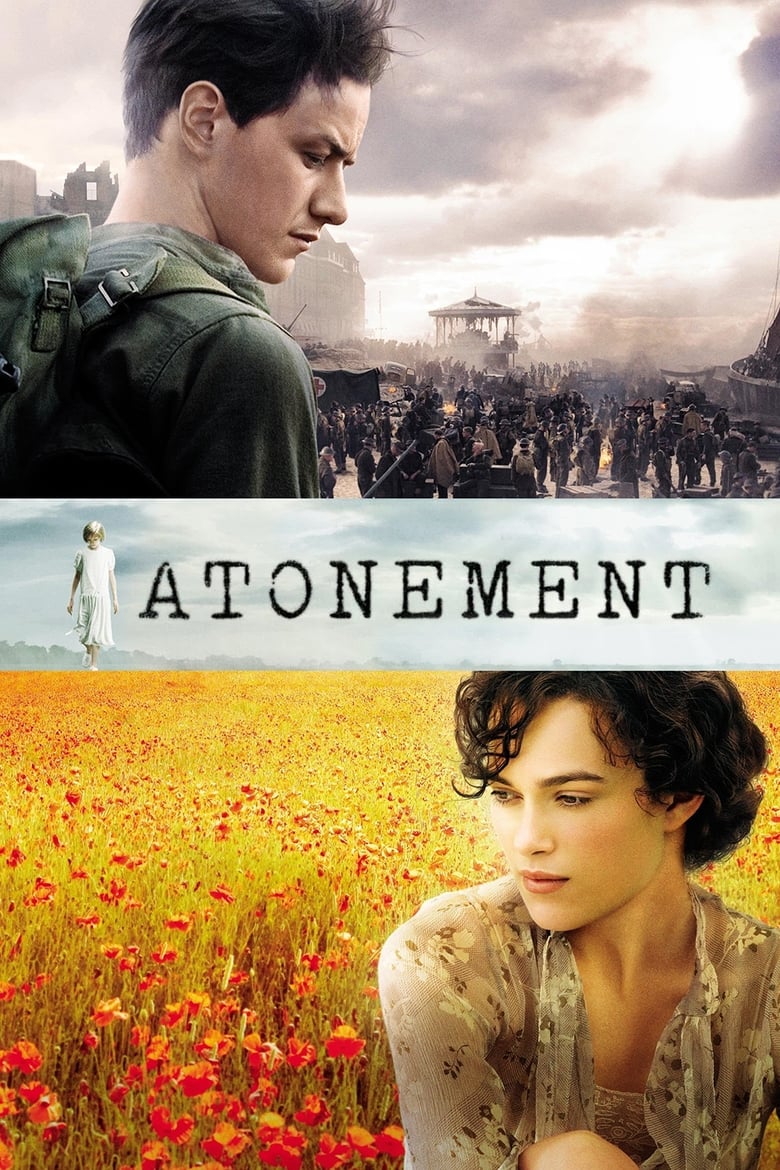
General
Atonement
Overview
As a 13-year-old, fledgling writer Briony Tallis irrevocably changes the course of several lives when she accuses her older sister's lover of a crime he did not commit.
Best reviews More

The first third of "Atonement" is superb. We are introduced to a group of affluent English aristocrats whiling away their summer hours at a massive estate.
One of them, Cecilia (Keira Knightley), is nursing a raging case of sexual attraction to her childhood friend and now family gardener, Robbie Turner (James McAvoy), while another, Cecilia's young sister Briony (Saoirse Ronan), spends her day writing a play which she plans to perform for a family gathering later that evening. Everyone is bored and listless in the summer heat. Briony, prey to an overactive imagination, keeps witnessing a series of increasingly serious moments of intimacy between Cecilia and Robbie that she isn't old enough to fully understand, and finally a false accusation by her is responsible for sending Robbie away from the estate in handcuffs. Everything about this part of the film is brilliant. The director Joe Wright ratchets the sexual tension to an almost unbearable pitch, and I was on the edge of my seat waiting to see what would happen.
But then the story and movie switched gears, and it lost some of that narrative momentum it had been so wonderfully building. The second and third acts of the film, while accomplished, do not deliver on the promise set up in the film's first part, and the movie never really succeeded in sucking me back in. When we next see Robbie, he's wandering through the desolate battlefields of WWII France, pining for Cecilia and nursing a chest wound. Wright shows off mightily in this part of the film; there's an astounding ten-minute tracking shot that depicts the allied forces on the beach of Dunkirk that will have cineastes slobbering. But like Robbie's mind, this part of the film starts to wander aimlessly, and even while I was admiring the sheer planning that went into this amazing shot, I couldn't help but wish that Wright would just get on with it already.
Finally, the film circles back to Briony, four years older and working as a nurse tending to the wounded. She's suffering a tremendous amount of guilt for the wrongs she's only now beginning to understand and wants to reach out to Cecilia (from whom she's now estranged) and Robbie to offer her apologies. I've not read the Iam McEwan novel on which this film is based, but even I could tell that this is where the screenwriter, Christopher Hampton, had the most trouble adapting the novel to the screen. Much of what "Atonement" is about becomes clear in this last act, as Briony ages into Vanessa Redgrave, a successful novelist who has finally written a novel that works as an outlet for her devastating feelings of guilt. We begin to realize here that "Atonement" isn't as much about the love affair between Cecilia and Robbie as it is about the act of writing and the power of words. Briony learns as a little girl how difficult words are to take back once they've been said; as an adult, she learns the ability of words to help us deal with regret. One particular scene that takes place between Cecilia, Robbie and Briony is a fiction inserted into their story by Briony the novelist; it's the story as she wishes it had been rather than as it actually was. Briony the woman can't change the past, but Briony the novelist can.
This is a wonderful idea, but unfortunately the screenplay doesn't quite know how to communicate this in cinematic terms, so it's told directly to the audience by Redgrave in a monologue at the film's conclusion. Redgrave is a luminous actress, but her soliloquy feels awkwardly inserted into the film. As for the other actors, they all do fine work. The young actress Saoirse Ronan is especially good, and James McAvoy proves further that he's becoming one of the finest young actors working today. But the screenplay sort of abandons him and Knightley after its first half hour or so to a warmed over version of "The English Patient," and the strong impact they both make early on dissipates gradually.
I admired "Atonement" for how it looked and the ideas it had to express, but I think it's an uneven film that doesn't entirely work.
Best video reviews
There are no video reviews for this movie yet.
Have you watched it?
Cast & Crew





